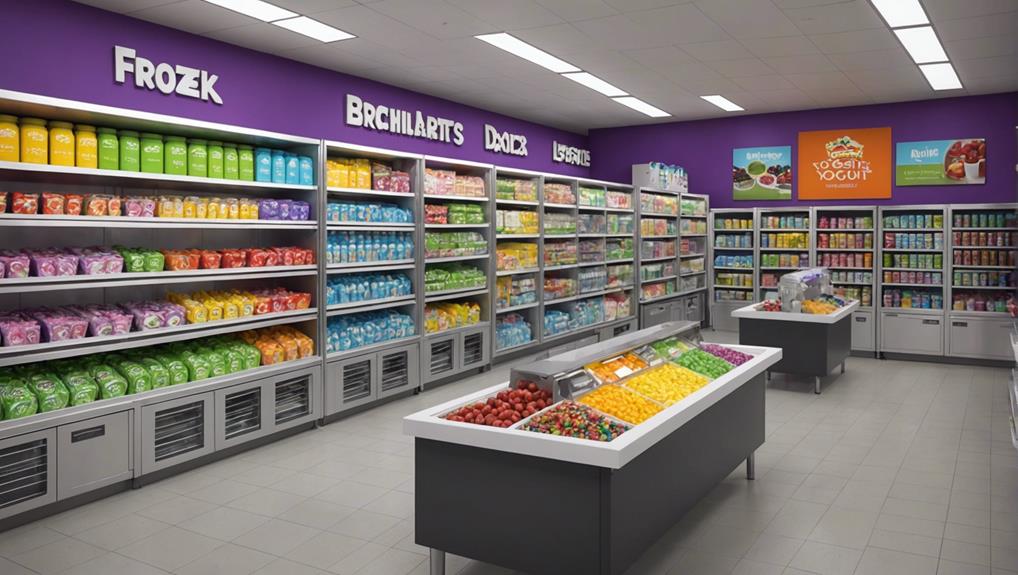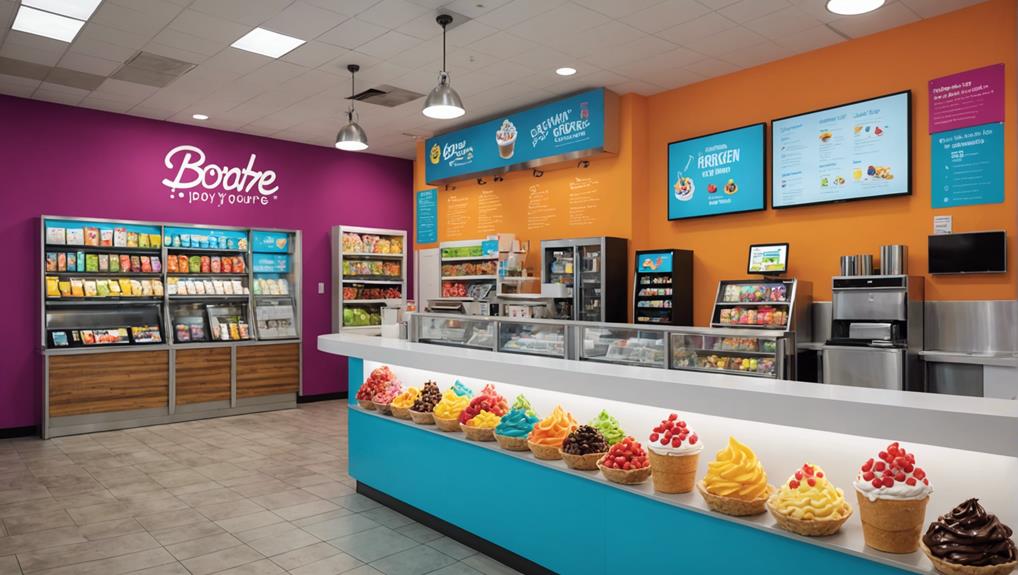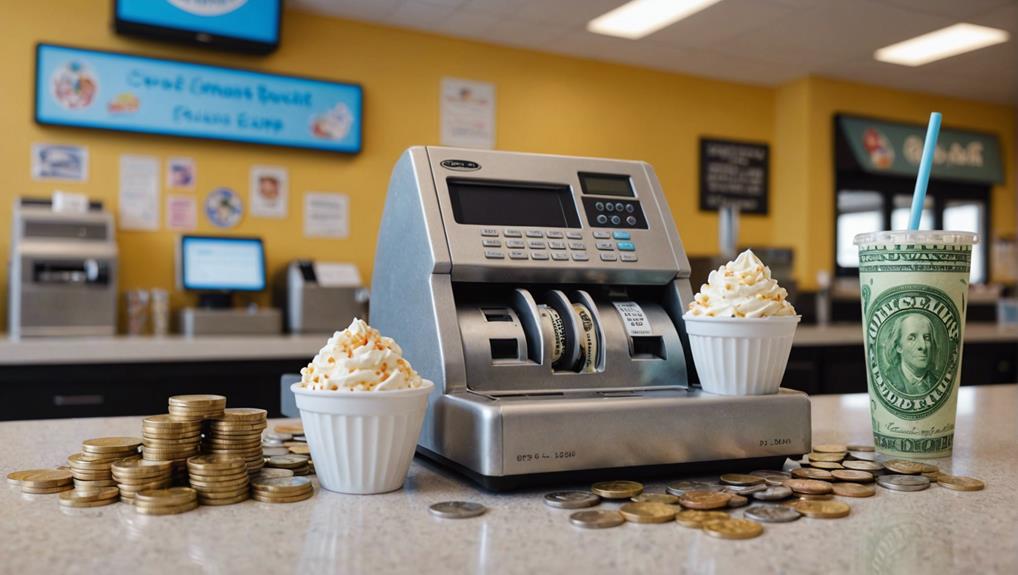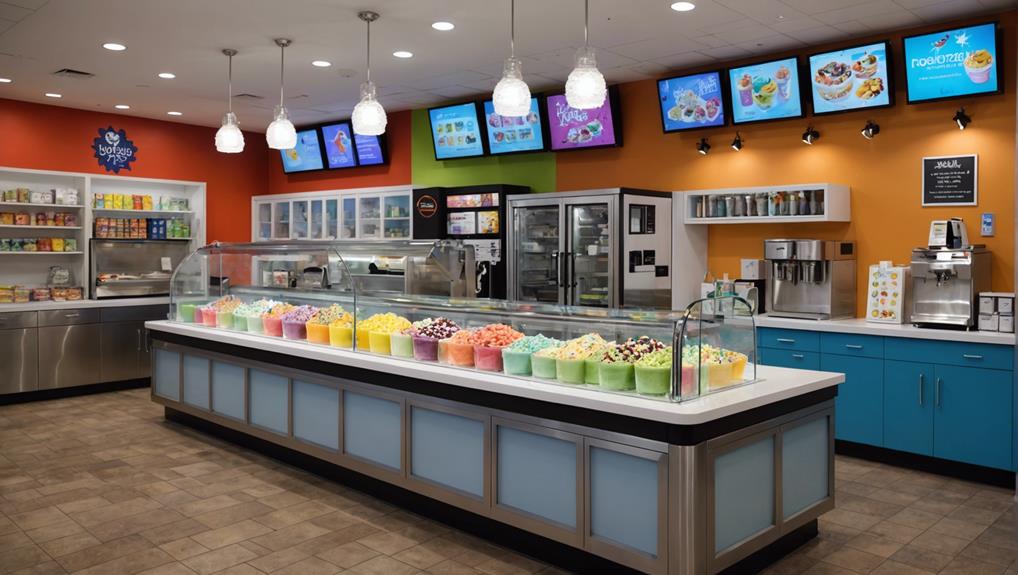Starting a frozen yogurt franchise involves significant financial commitments across various areas. Location costs, heavily influenced by market demand and foot traffic, can include rent, utilities, and insurance. Equipment expenses range widely, with machines costing between $400 and $1,500 and refrigeration units up to $10,000. Inventory costs fluctuate based on the variety and quantity of ingredients. Staffing, essential for operations, includes wages and training expenses. Marketing efforts can require up to $5,000 for initial promotions. Additional costs like legal fees, administrative expenses, and maintenance should also be factored in. Continue learning to thoroughly understand these diverse expenditures.
Key Takeaways
- Initial machine costs range between $400 and $1,500, influenced by brand and model.
- Rent or lease expenses vary greatly based on location and venue size, plus security deposits.
- Inventory costs include frozen yogurt mix, toppings, packaging materials, and specialty ingredients.
- Staffing costs cover wages, benefits, and training, representing a significant portion of operational expenses.
- Marketing expenses for promotions, social media, and local advertising can range from $1,000 to $5,000 initially.
Location Costs

When considering the establishment of a frozen yogurt franchise, location costs—encompassing rent, security deposits, utilities, and insurance—play a pivotal role in the overall investment strategy. Rent or lease expenses can vary greatly, typically ranging from $1,500 to $15,000 per month, dependent on factors such as geographical area and venue size. This variability necessitates a meticulous evaluation of potential locations to make sure they align with the franchise's budgetary constraints and revenue projections.
In addition to monthly rent, prospective franchisees should anticipate a security deposit requirement, generally amounting to one to three months' rent. This upfront cost is essential for securing a desirable lease agreement and must be factored into the initial investment calculation.
Utilities, including electricity and water, along with comprehensive insurance coverage, further contribute to location costs. These ongoing expenses are crucial for maintaining operational efficiency and safeguarding the business against unforeseen events.
Given that location costs represent a substantial portion of initial investment, selecting a site with high market demand and foot traffic is imperative. Thorough research and strategic planning are important to optimize these expenditures, thereby enhancing the franchise's potential for profitability and long-term success.
Equipment Expenses
When evaluating the equipment expenses for a frozen yogurt franchise, it is essential to take into account the costs associated with machines and dispensers, which can vary greatly based on quality and capacity. Equally important are refrigeration units, whose prices fluctuate depending on size and energy efficiency. Additionally, ongoing maintenance costs must be taken into consideration to guarantee efficient operation and longevity of equipment.
Machines and Dispensers
Investing in the right machines and dispensers is important for the operational efficiency and profitability of a frozen yogurt franchise. The initial investment in frozen yogurt machines and dispensers can vary greatly, based on factors such as model, brand, and technological features. Typically, the costs for these machines range between $400 to $1,500. High-quality machines, equipped with advanced technology, may require a higher upfront investment but often provide long-term benefits through enhanced performance and durability.
When selecting equipment, franchise owners should consider several key aspects:
- Machine Costs: Frozen yogurt machines vary in price from $400 to $1,500, influenced by brand and model.
- Dispenser Features: Dispensers for frozen yogurt also differ in price based on their capacity and additional features, impacting overall costs.
- Flavors and Capacity: It is important to account for the number of flavors and servings per hour a machine can handle, ensuring it meets customer demand.
- Maintenance: Proper upkeep and cleaning are essential for the longevity of the machines, reducing long-term operational costs.
A balanced approach to investing in frozen yogurt machines and dispensers, considering both initial costs and operational efficiency, is essential for the success of a frozen yogurt franchise.
Refrigeration Units
Securing high-quality refrigeration units is an essential investment for frozen yogurt franchises, with costs ranging from $2,000 to $10,000 per unit based on size, capacity, and energy efficiency. In the frozen yogurt business, these units are indispensable for maintaining the precise temperatures required to store and serve products effectively. The wide variance in costs reflects the diversity of options available, from compact models suited for smaller shops to large, energy-efficient units for high-volume operations.
Quality equipment is vital to guarantee the reliability and longevity of refrigeration units. Investing in top-tier models can mitigate the risk of operational disruptions due to equipment failure, which can be costly and adversely affect product quality. Additionally, energy-efficient refrigeration units, although potentially more expensive upfront, can lead to significant savings in electricity bills over time, balancing the initial investment with long-term operational cost efficiency.
Understanding the balance between initial costs and the benefits of reliable, quality equipment is important for franchise owners. While the upfront expenditure can be substantial, the return on investment through sustained product quality and reduced maintenance needs underscores the importance of selecting the right refrigeration units for a successful frozen yogurt business.
Maintenance Costs
While securing high-quality refrigeration units is a significant initial investment, maintaining these and other essential pieces of equipment is an ongoing expense that franchise owners must carefully manage. Effective budgeting for equipment maintenance is critical to guarantee operational efficiency and longevity. Here are key aspects to ponder:
- Frozen Yogurt Machines: Regular upkeep of frozen yogurt machines is essential, with maintenance costs ranging from $400 to $1,500. Regular maintenance helps in preventing breakdowns and ensures consistent product quality.
- Refrigeration Units: The maintenance of refrigeration units is another critical aspect. Periodic checks and servicing can prevent significant repair costs and enhance the overall operational efficiency of the franchise.
- Point of Sale Systems: These systems require ongoing support to function smoothly. Frequent updates and minor repairs can add to the maintenance costs, but they are essential for uninterrupted business operations.
- Other Fixtures: Additional equipment such as mixers and dispensers also require regular attention. Proper maintenance helps in extending the lifespan of these fixtures, minimizing unexpected repair costs.
Inventory Costs

Managing inventory costs in a frozen yogurt franchise involves a careful balancing act between maintaining high-quality products and controlling expenses. Inventory costs encompass a variety of components, including the price of the frozen yogurt mix, toppings, packaging materials, and specialty ingredients. The cost of toppings and mix-ins can fluctuate greatly, depending on the diversity and quantities offered. Popular choices such as fresh fruits, candies, and nuts must be carefully managed to avoid excessive waste while ensuring availability, which directly impacts customer satisfaction.
Packaging materials are another critical factor. Customized and branded packaging can enhance the franchise's image but also increase costs. Therefore, selecting cost-effective yet attractive packaging is crucial for maintaining a balance between brand presentation and expense control. Additionally, catering to customers with special dietary needs, such as offering dairy-free or gluten-free options, often involves higher expenditure due to the use of specialty ingredients.
Ultimately, the challenge lies in maintaining a balanced stock level that ensures product freshness and variety while minimizing financial waste. By strategically managing these inventory costs, a frozen yogurt franchise can achieve a harmonious blend of quality and profitability, thereby ensuring sustained customer satisfaction and controlled expenses.
Staffing Costs
Effectively managing staffing costs is vital for the operational success and profitability of a frozen yogurt franchise. These costs typically encompass wages, benefits, and training expenses, and are a significant portion of the operational expenses. A well-structured approach to overseeing staff costs can guarantee sustainable business operations while maintaining high service quality.
Key components of staffing costs include:
- Wages: The primary expense involves paying employees, which varies depending on local minimum wage laws and the competitive landscape. This makes it important to balance fair compensation with business profitability.
- Benefits: Offering benefits such as health insurance, paid time off, and retirement plans can attract and retain quality employees. However, these benefits increase operational expenses and must be budgeted carefully.
- Training Expenses: Initial and ongoing training for employees ensures they are knowledgeable about product offerings and customer service standards. Effective training reduces errors and enhances customer satisfaction, but it also represents a continuous investment.
- Additional Employee Expenses: This category includes costs for uniforms, supplies, and security systems. These expenses, albeit smaller, contribute to the overall staffing budget and must be managed efficiently.
Marketing Expenses

Marketing expenses are an important consideration for any frozen yogurt franchise, encompassing a range of activities from grand opening promotions to ongoing social media campaigns. The costs associated with advertising campaigns can vary greatly depending on the scope and reach desired, while social media budgets are tailored to the franchise's target audience and engagement goals. Understanding these expenses is essential for developing a robust marketing strategy that maximizes customer attraction and retention.
Advertising Campaign Costs
Understanding the various advertising campaign costs involved in operating a frozen yogurt franchise is essential for budgeting and strategic planning. Effective marketing strategies can have a substantial impact on the franchise's success and profitability. Here are four key aspects to keep in mind:
- Grand Opening Promotion: Launching a franchise often involves a grand opening promotion, which can cost between $1,000 to $5,000. This investment helps create a buzz and attract initial customers, setting the tone for future business operations.
- Social Media Marketing: Allocating funds for social media marketing campaigns is vital for maintaining a strong online presence. These campaigns typically range from $500 to $2,000 per month, depending on their scope and reach. This includes content creation, ad placements, and engagement activities.
- Local Advertising: Local advertising costs vary from $500 to $2,000 per month, depending on the chosen distribution channels and the complexity of the design. This encompasses traditional media such as newspapers and radio, as well as localized online ads.
- Loyalty Program and Collaboration Costs: Implementing a loyalty program can cost between $500 to $1,500 for setup and ongoing rewards. Additionally, collaboration costs with local businesses or partnerships may range from $500 to $2,000, fostering community relationships and shared marketing benefits.
Social Media Budget
Allocating a strategic portion of the overall marketing budget to social media is essential for enhancing brand visibility and engaging with a targeted audience. For a frozen yogurt franchise, the average social media marketing budget ranges from $500 to $2,000 per month. This investment can greatly impact customer engagement and brand awareness by tailoring advertising objectives to reach a specific target audience.
The costs associated with social media marketing can vary widely based on the platforms used. For instance, targeted ads on Facebook and Instagram are particularly effective in reaching potential customers due to their extensive user bases. However, achieving best results requires a well-defined strategy that aligns with the franchise's advertising objectives.
Beyond paid ads, the creation of engaging content and influencer partnerships form a critical part of the social media marketing budget. Collaborating with influencers who resonate with the brand's values can amplify outreach and foster authentic customer engagement. Promotions and interactive posts further enhance audience interaction and retention.
Utilities and Maintenance
Managing utilities and maintenance is an essential operational aspect for frozen yogurt franchises, directly impacting both cost efficiency and service quality. These ongoing expenses are pivotal in maintaining the smooth operation and profitability of the business. Key considerations include:
- Utilities: Regular expenditures on electricity and water are unavoidable. These costs must be factored into the operational budget, as they are critical for keeping the frozen yogurt machines and refrigeration units running efficiently.
- Maintenance: Equipment maintenance is another significant ongoing expense. The upkeep and repair of frozen yogurt machines, refrigeration units, and other fixtures can vary in cost, but regular maintenance is vital to avoid costly breakdowns and ensure consistent product quality.
- Regulatory Compliance: Adhering to local and state regulations necessitates ongoing expenses related to permits, licenses, and inspections. These costs are essential for guaranteeing that the business operates legally and avoids fines or shutdowns.
- Security Deposits: Typically amounting to one to three months' worth of rent, security deposits are an upfront cost but can also be considered part of the broader maintenance budget, as they serve as a financial buffer for potential damages.
Effectively managing these areas within the operational budget is critical for the financial health and sustainability of a frozen yogurt franchise.
Legal Fees

Managing legal fees is an essential aspect for frozen yogurt franchise owners, encompassing costs that range from initial incorporation to ongoing compliance and employee-related legalities. Establishing a franchise can incur legal fees ranging from $500 to $3,000 for routine matters, covering the drafting of franchise agreements, securing necessary permits, and ensuring adherence to local regulations. Incorporation costs further add to these legal costs, typically varying between $1,000 and $2,500, depending on the complexity of the business structure and jurisdictional requirements.
Ongoing legal expenses are another critical consideration. Employee hiring, for instance, encompasses legal fees associated with drafting employment contracts, ensuring compliance with labor laws, and addressing other HR-related legalities. These legal costs can range from $100 to $500, depending on the level of expertise required and the specific needs of the franchise.
Routine legal matters also necessitate periodic consultations with legal professionals to maintain compliance with evolving regulations. This underscores the importance of budgeting for legal fees as part of the overall financial strategy of a frozen yogurt franchise. By proactively managing these costs, franchise owners can mitigate potential legal risks and focus on the operational success of their business.
Administrative Costs
Beyond legal fees, administrative costs represent a significant portion of the financial considerations for frozen yogurt franchise owners. These expenses encompass several categories that are essential for the smooth operation and compliance of the business. Here are four key areas where administrative costs are incurred:
- Incorporation Costs: Establishing a legal entity for the franchise involves incorporation costs, which typically range from $1,000 to $2,500. This process guarantees the business is legally recognized and can operate within the jurisdiction.
- Accounting Fees: Routine financial management is vital. Initial accounting fees for setting up financial systems can range from $500 to $3,000. Additionally, monthly accounting fees for bookkeeping services can vary between $150 to $500, ensuring accurate financial tracking and reporting.
- Permit and License Costs: Compliance with local regulations requires obtaining various permits and licenses. These costs can range from $50 to several hundred dollars, depending on the location and size of the franchise, and are necessary for legal operation.
- Employee Costs: Hiring and training employees present additional expenses, ranging from $100 to $500. Ongoing payroll and benefits further contribute to administrative costs, ensuring staff are well-compensated and trained.
Contingency Fund

A contingency fund is a critical financial safeguard for frozen yogurt franchise owners, providing a buffer against unexpected expenses and guaranteeing ongoing operational stability. This fund is indispensable for handling unforeseen costs, such as equipment repairs, inventory shortages, or sudden increases in operating expenses. To maintain financial stability, franchise owners should make regular monthly contributions to their contingency fund.
Industry experts recommend that a well-funded contingency plan should cover approximately 3-6 months' worth of operating expenses. This strategic reserve can mitigate financial risks and support continuous business operations even in times of unexpected financial strain.
| Fund Size | Description |
|---|---|
| 1 Month | Minimal coverage, high risk |
| 3 Months | Moderate coverage, balanced risk |
| 6 Months | Best coverage, low risk |
| Over 6 Months | Extensive coverage, very low risk |
Regular monthly contributions to the contingency fund are essential. By systematically setting aside funds, franchise owners can make sure that they are prepared for any financial surprises that may arise. This proactive approach not only enhances financial stability but also promotes long-term success in the competitive frozen yogurt industry. By adhering to these best practices, franchise owners can effectively safeguard their investments and ensure the smooth operation of their businesses.
Frequently Asked Questions
Can You Make Money With a Frozen Yogurt Business?
Yes, profitability in a frozen yogurt business is achievable through understanding customer demographics, implementing effective marketing strategies, adapting to seasonal trends, fostering product innovation, enhancing operational efficiency, and conducting thorough competitive analysis.
How Much Does It Cost to Start a Yogurtland?
To start a Yogurtland franchise, the initial investment ranges from $180,000 to $490,000, inclusive of a $35,000 franchise fee. This startup cost covers equipment expenses, location selection, and a substantial marketing budget.
What Is the Net Worth Requirement for a Pinkberry Franchise?
The net worth requirement for a Pinkberry franchise is $500,000. This financial prerequisite validates that potential franchisees meet specific franchise criteria, demonstrating financial eligibility and stability necessary for a successful Pinkberry investment and adherence to franchise requirements.
Are Ice Cream Franchises Profitable?
Ice cream franchises can be profitable, driven by market trends, seasonal demand, and effective competitor analysis. Success hinges on understanding customer preferences, fostering brand loyalty, and implementing strategic marketing strategies to enhance revenue and profitability.
Conclusion
To summarize, location costs demand strategic consideration, equipment expenses necessitate substantial investment, inventory costs require meticulous management, staffing costs involve ongoing commitments, marketing expenses call for creative allocation, utilities and maintenance demand regular oversight, legal fees mandate thorough compliance, administrative costs necessitate detailed budgeting, and a contingency fund guarantees financial resilience. The myriad expenses associated with operating a frozen yogurt franchise underscore the need for thorough financial planning and astute business management to achieve sustainable profitability.







